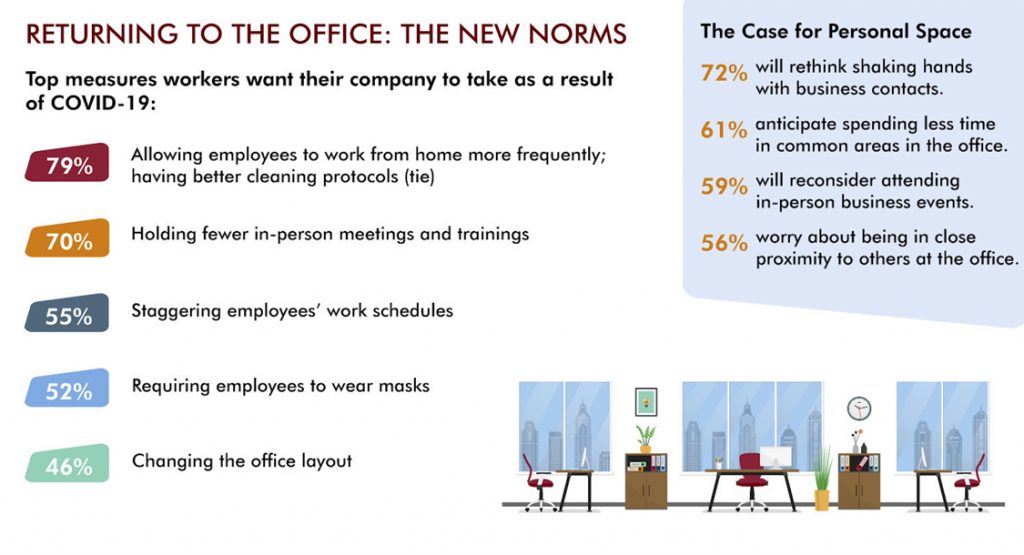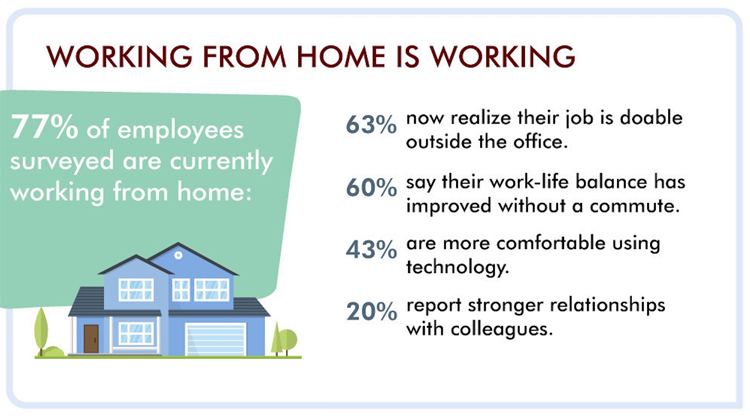Staff are apprehensive about returning to the workplace post Covid-19, according to a new survey carried out by global staffing firm Robert Half. It also reveals how employers should adapt and prepare the workplace to prevent the risk of contagion and protect staff health and safety.
According to the research, professionals feel some “apprehension about going back to the workspace post Covid-19, with 56% of employees worried about being in close proximity to colleagues. In fact, 72% of employees said they will rethink shaking hands with business contacts.
Around 74% said they would like to work remotely more frequently than before the outbreak. In fact, mostly parents (79%) than those without children (68%) expressed a preference for homeworking. Yet, at the same time, 55% believe it will be more difficult to build strong relationships with colleagues if teams aren’t in the same building as much.
CHANGING BUSINESS PROTOCOLS POST COVID-19
Business protocols will undoubtedly change as a result of the coronavirus pandemic, to better safeguard staff wellbeing during and post-Covid-19. So how are business protocols likely to change? Of the office professionals surveyed 72% will rethink shaking hands with business contacts, and 72% plan to schedule fewer in-person meetings.
Around 61% anticipate spending less time in common areas in the office. Nearly 6 in 10 will reconsider attending in-person business events (59%) and travelling for business (57%). Around 73% think there will be fewer in-person social and team-building activities with colleagues.

New research from Robert Half reveals how employees feel about their current work situation and the future. Source: Robert Half Survey
ADAPTING TO THE NEW NORMAL
Employees undoubtedly expect their organisation to adapt to the new normal. 79% said the expect companies to allow employees to work from home more frequently, and another 79% expect better cleaning procedures. Around 70% said the company should hold fewer in person meetings and training, while 55% said employers should stagger work schedules. In fact, 52% said they expect employers to require staff to wear masks, while 46% expect the company to change office layout to help social distancing.
According to Paul McDonald, Senior Executive Director of Robert Half. “When companies open their doors again, ‘business as usual’ will be different. Employers and their teams have been resourceful in operating from dispersed locations, and there are going to be important lessons learned that will guide future collaboration. Managers should use any time of transition to reassess priorities and make meaningful change that improves the work environment. The pandemic is causing fear and anxiety, and employees will want reassurance their employer is prioritising health and safety.”
SILVER LINING

On a positive note, of those staff working from home (77%), around 63% realised their job is doable from home, while 60% said that work-life balance has improved as a result of not having to commute. Approximately, 43% said they are more comfortable using technology and another 20% reported improved and stronger relationships with colleagues.







































